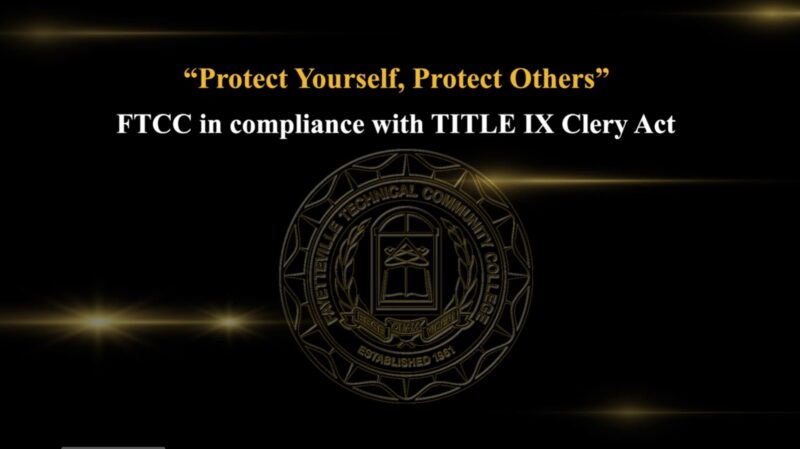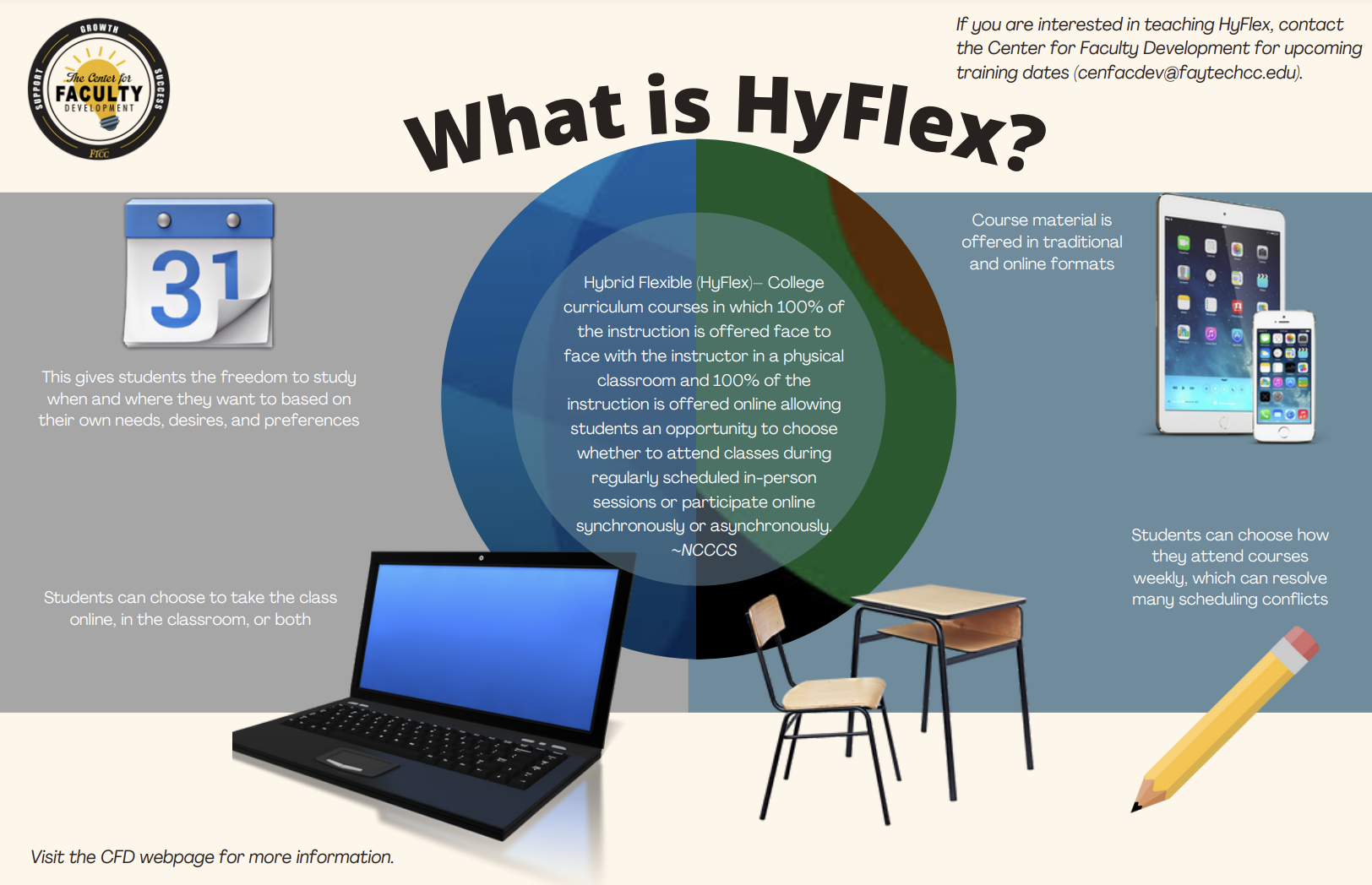Carl E. Mitchell: Title IX Coordinator
Email: mitchelc@faytechcc.edu
Phone: 910-678-8373 or 8378
Barbara M. Poggetti: Deputy Title IX Coordinator
Email: poggettb@faytechcc.edu
Phone: 910-678-8246
FTCC & Title IX Compliance
Administration, faculty, staff & students play an important role in promoting and maintaining safe campus for all.
Students are encouraged to view this video tutorial as soon as possible after registering for classes.
This video was produced by Fayetteville Technical Community College & has been approved by the college’s Title IX compliance office.
Policy: Sexual Harassment/Violence Prevention (Title IX Processes)
All members of the College community are expected and instructed to conduct themselves so as to contribute to an atmosphere free of illegal discrimination, including sexual harassment or sexual violence. Sexual harassment, as defined below, of an employee by another employee or student or of a student by another student or employee is a violation of this College policy and will not be tolerated. Any employee or student violating this policy shall be disciplined in accordance with the procedures outlined below.
It is a violation of this policy for any faculty, staff, or student to retaliate against any other person involved in a Title IX complaint. However, an action imposed on the respondent by and through the processes described in this policy is not retaliation.
This policy is adopted to promote an atmosphere in which all members of the Fayetteville Technical Community College community may work and study free of sexual harassment/violence or assault and to provide for the orderly resolution of complaints of such illegal activities.
What is Title IX?
The U.S. Department of Education’s Office for Civil Rights (OCR) enforces, among other statutes, Title IX of the Education Amendments of 1972. Title IX protects people from discrimination based on sex in education programs or activities that receive Federal financial assistance. Title IX states that: No person in the United States shall, on the basis of sex, be excluded from participation in, be denied the benefits of, or be subjected to discrimination under any education program or activity receiving Federal financial assistance.
How do I File a Title IX Complaint
Complaints in violation of College’s Sexual Harassment/Violence Prevention Policy (Title IX) should be directed to the Office of Public Safety and Security or to the appropriate Deputy Title IX Coordinator listed below as soon as practical. Those wishing to report a violation are encouraged, but not required, to do so by completing and submitting a Discrimination/Harassment Complaint Form D-8 (available in the fill-in forms) to one of the Title IX Investigators or the appropriate Deputy Title IX Coordinator.
Title IX Officers
Persons wishing to file Title IX violation complaint may contact one of the following:
Chief Joseph Bailer, Director of Public Safety and Security
Title IX Investigator
Office location: General Classroom Building Room GCB 102
Phone: (910) 678-8433
Email: bailerj@faytechcc.edu
Captain Jonathan Fennema, Assistant Director of Public Safety and Security
Title IX Investigator
Office location: General Classroom Building Room GCB 102
Phone: (910) 678-8433
Email: fennemaj@faytechcc.edu
Senior Lieutenant Summer Porter, Title IX Investigator/Case Manager
Title IX Investigator/Case Manager
Office location: General Classroom Building Room GCB 102
Phone: (910) 678-8433
Email: russells@faytechcc.edu
Mr. Carl Mitchell, Vice President for HR/IE
Title IX Coordinator
Office location: Thomas McLean Administration Building, Room ADM 162
Phone: (910) 678-8373
Email: mitchelc@faytechcc.edu
Hours: Monday – Friday, 8:00 a.m. to 5:00 p.m.
Ms. Barbara Poggetti, Personnel Manager
Deputy Title IX Coordinator
Office location: Thomas McLean Administration Building, ADM Room 162
Phone: (910) 678-8373
Email: mitchelc@faytechcc.edu
Hours: Monday – Friday, 7:30 a.m. to 4:30 p.m.
Dr. Jolee Marsh, Associate Vice President for Corporate and Continuing Education
Corporate and Continuing Education Students Deputy Title IX Coordinator
Office location: Neil Currie Building, Room NC 1B
Phone: (910) 678-8217
Email: marshj@faytechcc.edu
Hours: Monday – Friday, 8:00 a.m. to 5:00 p.m.
After Business Hours Reporting
Public Safety and Security Office
Phone: (910) 678-8433
Location: GCB 102
All Title IX Officers and other officials have been trained in the proper handling of Title IX matters. Training materials listed below are copyrighted by the company indicated and cannot be used without their permission. The materials are only for review purposes and are used with the permission of the copyright holders.
Training materials can be found using the following links:
Presumption that Respondent did not Engage in Wrongful Conduct
Inherent within all proceedings related to a Title IX complaint, whether formal or informal, is an assumption that the person against whom allegations are made did not engage in the conduct giving rise to the complaint. This presumption exists until a final decision is made by the College in the matter.
What to Expect When filing a Complaint
Notice to Respondent: Upon receipt of a complaint alleging a violation of policy VI-9.1 and before any interview of the Respondent relating to the Complaint, the Title IX Coordinator or Deputy Coordinator shall provide the Complainant and Respondent written notice of the Complaint that includes:
- A statement that the process by which the complaint will be resolved meets the requirements of Title IX and its associated regulations as stated in 34 CFR 106;
- That the resolution of the complaint may be obtained through a voluntary and informal resolution process which complies with 34 CFR 106;
- Sufficient details of the complaint, including the identities of the known individuals involved in the incident, the conduct alleged to violate the College’s policy, the location(s) of the alleged conduct, and the date(s) of the alleged conduct;
- A statement that the Respondent is presumed not responsible for the alleged conduct;
- Notice that presumption may end only at the conclusion of the process described in this Sexual Harassment / Violence Prevention Policy;
- That both the Complainant and the Respondent may be represented by an advisor of their choice at all stages of the process to resolve the complaint, and that the advisor is permitted to be, but not required to be, a parent or an attorney;
- A request that the Complainant and the Respondent notify the Title IX Coordinator of any advisor selected to represent the Complainant or the Respondent during the process described in this policy and provide authorization permitting the College to release information to their selected advisor for the purposes of seeking a resolution to the complaint;
- Notice that all evidence obtained during the process by the Title IX Coordinator, Deputy Coordinator, and Investigators is available for inspection and review by the parties and their advisors;
- A reminder that the Complainant and Respondent are prohibited from making false statements or submitting false information to the College; and,
- A statement that the Respondent will receive an additional written notification if allegations not specifically identified in any prior written notification are to be investigated or additional parties to the Complaint are identified.
- Identification of the Title IX Coordinator or Deputy Coordinator who is responsible for the coordination of this Title IX process.
Informal Resolution: The informal resolution process is not available to resolve any complaint involving sexual harassment / violence of a student by a college employee.
At any time after a formal complaint is filed but before a decision of responsibility is made following a hearing, the Title IX Coordinator or Deputy Coordinator may offer the Complainant and Respondent the opportunity to attempt to resolve the Complaint informally. If an informal resolution is to be attempted, the Title IX Coordinator or the Deputy Coordinator must provide written notice to the Complainant and Respondent of the allegations alleged in the Complaint and a statement that if agreement is reached between the Complainant and the Respondent during the informal resolution process, the Complaint will be deemed resolved and no further action will be taken by the College on the conduct and circumstances giving rise to the complaint.
No face-to-face meeting is required during an informal resolution process, and participation in such a process must be voluntary. Both the Complainant and Respondent must consent in writing to an attempt to informally resolve the Complaint. Either party may withdraw their consent to an informal process to resolve the Complaint by providing written notice to the Title IX Coordinator or Deputy Coordinator. Any withdrawal of consent must be received by the Title IX Coordinator or Deputy Coordinator before agreement is reached on the resolution of any complaint, including agreement on sanctions and remedies. Once an agreement is reached to informally resolve the Complaint, the Complaint shall be closed and no further action may be taken against the Respondent on the conduct identified in the Complaint. Agreement shall be deemed reached when both parties agree in writing as to the informal resolution, or when the time period for objecting to a propose informal resolution expires. At least 10 calendar days must be granted for a party to object.
Investigation: The Title IX Investigator, Deputy Investigator, or designees (collectively “Investigators”) shall be responsible for investigating all allegations of conduct which violates the Sexual Harassment/Violence Prevention Policy (“Policy”). All investigative efforts will be conducted in a fair and impartial manner and shall presume the Respondent did not engage in any alleged conduct that violated the Policy. Investigations must be assigned to an investigator that does not have a conflict of interest in the matter.
Neither the Investigators nor any other representative of the College shall access medical, psychiatric, or psychological records of either party, unless that party voluntarily consents to the release to the College of that information. In addition, Investigators shall
- Conduct the investigation in a timely manner. Except in unusual circumstances, the investigation should be substantially completed within 20 calendar days of the receipt of the Complaint by the Title IX Investigator or Deputy Investigator;
- Provide each party an equal opportunity to identify witnesses – such as fact or expert witnesses – to the Investigator(s);
- Provide each party with an equal opportunity to share with Investigator(s) evidence, whether of an inculpatory or exculpatory nature;
- Fully investigate the allegations of a violation of the Policy, including exploration of evidence, if any, provided by the Complainant and Respondent;
- Permit any party, whose presence is required or requested during a part of the investigation, such as during an interview, to have an advisor, chosen by the party, to be present for that part of the investigation. The selected advisor may not unreasonably interfere or disrupt the investigation, including the interview of the party represented;
- All interviews will be recorded and the interviewee will be told the interview is being recorded;
- Allow the Complainant and Respondent to discuss the allegations with others, but Investigators may request that information be held in confidence;
- Prior to the conclusion of the investigation, permit both parties and their advisors an equal and reasonable opportunity to review all evidence related to the Complaint and collected by the Investigators, including evidence gathered that the Investigators do not intend to rely upon;
- After inspection of the evidence, permit each party at least 5 calendar days to provide Investigators with any response they may have as to the evidence gathered;
- Consider any responses received to the evidence gathered and prepare a draft investigative report and share the report with the Respondent, Complainant, and their advisors. The Complainant and the Respondent shall have 10 calendars days to submit any response they may have to the draft investigative report;
- Provide a copy of the final investigative report that fairly summarizes all relevant evidence to both the Respondent, Complainant, and their advisors at least 10 days prior to any hearing on the matter. If either party wishes to provide a response to the investigative report, the response should be provided to the Title IX Coordinator or Deputy Coordinator; and,
- Provide a copy of the final investigative report to the Title IX Coordinator and/or Deputy Coordinator.
Dismissal: Any allegation of a violation of Title IX shall be dismissed if it is determined that the conduct about which the complaint was filed could not amount to a violation of Title IX even if the allegations were true. Any allegation of a violation of Title IX shall also be dismissed in the event the conduct occurred against a person not in the United States.
In addition, the Title IX Coordinator may dismiss any allegation of a violation of Title IX if the Complainant requests in writing at any time before a hearing on the matter concludes that the complaint be dismissed. A complaint may also be dismissed if the Respondent ends his/her enrollment and/or employment with the College or if specific circumstances prevent the investigation from gathering sufficient evidence to support a determination as to the formal allegations or complaint.
Hearing: The purpose of any hearing is to attempt to hear all relevant evidence and make a fair and impartial decision as to the allegations which are made. Subject to the rules stated below, the Hearing Officer shall be selected by the College President and shall preside over hearings involving Title IX complaints. The Hearing Officer need not be a licensed attorney and the state and federal rules of evidence and civil procedure do not apply. Instead, the Hearing Officer will endeavor to permit the presentation of all relevant information and the opportunity to the cross-examination of information presented. All participants in the hearing shall conduct themselves in a respectful and civil manner.
The Hearing Officer shall not permit the Complainant or the Respondent to question or cross-examine each other directly. The Hearing Officer must permit each party’s advisor to ask the other party and any witnesses all relevant questions and follow-up questions, including those that challenge the credibility of a witness or evidence. Additional details include:
- Cross-examination at the live hearing must be conducted directly, orally, and in real time by the party’s advisor of choice and never by a party directly.
- At the request of either party, the recipient must provide for the entire live hearing (including cross-examination) to occur with the parties located in separate rooms with technology enabling the parties to see and hear one another.
- Only relevant cross-examination and other questions may be asked of a party or witness. Before a complainant, respondent, or witness answers a cross-examination or other question, the Hearing Officer must first determine whether the question is relevant and explain to the party’s advisor asking cross-examination questions any decision to exclude a question as not relevant.
- If a party or witness does not submit to cross-examination at the live hearing, the Hearing Officer must not rely on any statement of that party or witness in reaching a determination regarding responsibility; provided, however, that the Hearing Officer cannot draw an inference about the determination regarding responsibility based solely on a party’s or witness’s absence from the live hearing or refusal to answer cross-examination or other questions.
- The Hearing Officer must deem as irrelevant questions and evidence about a complainants’ prior sexual behavior unless offered to prove that someone other than the respondent committed the alleged misconduct or offered to prove consent.
- Live hearings may be conducted with all parties physically present in the same geographic location or, at the College’s discretion, any or all parties, witnesses, and other participants may appear at the live hearing virtually.
- Hearings shall be recorded and a copy of the recording shall be made available to either party or their advisor upon request.
Standard of Evidence: The decision made by the Hearing Officer after the conclusion of the hearing, shall be fair and impartial and based upon the Preponderance of Evidence standard as defined in this policy.
Appointment of Advisors: During any hearing, both the Complainant and the Respondent shall have an advisor they select or an advisor appointed by the College. Advisors may be, but are not required to be, parents and/or attorneys. If either the Complainant or Respondent fail to select an advisor, the College will appoint an advisor to provide the person with assistance and guidance, including the cross examination of witnesses and evidence during the hearing. In the event an advisor is appointed by the College, the advisor selected shall have no conflicts of interest that might impair their ability to provide representation. Advisors appointed by the College will be trained in Title IX matters, but may not be an attorney – even if the other party is represented by an attorney.
Written Decision: The Hearing Officer shall prepare a written decision which, at a minimum, shall include:
- A list of all allegations within the complaint that potentially constitute sexual harassment as defined in this policy;
- A general description of each step taken from the time the complaint was received and through the completion of the hearing;
- Findings of fact;
- Discussion of the College’s policy and how the findings of facts support the determination in light of the College’s policy;
- A statement of the result of as to each allegation and the rationale for each result;
- A list of any sanctions imposed on Respondent and a list of any remedies provided to Complainant, if the Respondent is found to have violated the College’s policies related to sexual harassment using the Preponderance of Evidence standard; and,
- A statement of any appeal rights available to the Complainant or Respondent and deadlines to file any appeal.
- The Hearing Officer shall prepare the written decision and provide it, within 10 calendar days, to the Complainant, the Respondent, and the Title IX Coordinator using each party’s college e-mail address.
Sanctions: Sanctions include but are not limited to:
- For College Employees: informal counseling, formal Performance Improvement Plans, probation, suspension (with or without pay), and/or termination.
- For College Students: transfer from one course section to another, completion of counseling, probation, suspension, and/or permanent expulsion.
Remedies: Any remedy to which the Complainant and Respondent agrees and which does not burden the Respondent, may be granted by the College to the Complainant. In the event the Respondent is found to have engaged in conduct that violated Title IX, remedies may be granted to the Complainant that burden the Respondent when such remedies are recommended by the Hearing Officer. Remedies may include, but are not limited to: referrals to counseling, advocacy, and support agencies such as the Employee/Student Assistance Program, security escorts while on college properties, and/or schedule adjustments.
Appeal: Either the Respondent or Complainant may appeal the decision of the Hearing Officer. Any appeal must be in writing and must be e-mailed to the Title IX Coordinator located in the Human Resources Office. The appeal shall be e-mailed to the Title IX Coordinator within 15 calendar days after the written decision of the Hearing Officer is e-mailed to the Complainant and Respondent. If the Title IX Coordinator does not receive an appeal within the 15 calendar days, the decision of the Hearing Officer shall be deemed final and no additional administrative appeal rights shall be available for either party.
Upon receipt of any appeal, the Title IX Coordinator shall e-mail the appeal to the non-appealing party. The non-appealing party shall have 15 calendar days to respond to the appeal. Any response to the appeal shall be e-mailed to the Title IX Coordinator, located in the Human Resources Office, who shall share a copy of the response with the appealing party.
Appeals may be made only for one or more of the following reasons:
- Procedural irregularity that affected the outcome of the matter;
- New evidence which could have reasonably affected the outcome of the matter when the new evidence was not reasonably available at the time the Hearing Officer rendered a decision in the matter; or,
- The existence of an actual conflict of interest or bias against either the Complainant or the Respondent where the conflict or bias affected the outcome of the matter.
Once time has expired for the non-appealing party’s response to the appeal, the Title IX Coordinator shall provide to the College President the Hearing Officer’s decision, the Appeal, the response to the appeal, if any, and any other relevant information. The College President shall review all relevant information and shall draft a final decision in the matter. That draft shall be shared with the Complainant and the Respondent by e-mail within 15 calendar days of the College President’s receipt of the appeal and associated information from the Title IX Coordinator. The Complainant and the Respondent shall have 7 calendar days to review and respond to the draft. The College president shall review any response received, shall make any changes to the draft if warranted, and shall render a final decision in the appeal. The final decision shall describe the result of the appeal and the rationale for the result. The final decision of the College President shall not be appealable and no further administrative procedure in the matter shall be available to either party.
Sexual Harassment/Violence Prevention Definitions
For the purpose of these procedures, the definitions listed here shall apply:
- Consent is defined as an affirmative action through clear words or actions that creates the mutual understandable permission of all parties to willingly engage in sexual activity and the conditions of such activity. Consent can only be given by one who has the mental and physical capacity to make such a decision, and it must be clear, knowing, and voluntary. Consent to engage in one form of sexual activity cannot automatically imply to consent to engage is any other form of sexual activity. Previous relationships or prior consent cannot imply consent to future sex acts. Consent can be withdrawn at any time. Consent may not be granted by a person known to be, or by one who should be known to be, mentally or physically incapacitated. It should be recognized that the lack of protest or resistance is not, in and of itself, consent and persons who are asleep, unconscious, or unable to communicate due to a mental or physical condition are not capable of granting consent.
- Complainant is defined as an individual who is alleged to be the victim of conduct that could constitute sexual harassment.
- Formal Complaint is defined as a document filed by a Complainant or signed by the Title IX Coordinator alleging sexual harassment against a Respondent and requesting the College investigate the allegation of sexual harassment.
- Preponderance of the Evidence shall be defined as a finding that a claim or allegation is more likely than not to be true. This term does not refer to the quantity of evidence but rather to the quality of the evidence. It means that the fact finder must be persuaded, considering all the evidence, that the necessary facts to establish the allegation are more likely than not to exist.
- Respondent is defined as an individual who has been reported to be the perpetrator of conduct that could constitute sexual harassment.
- Sexual Harassment is defined as conduct on the basis of sex that satisfies one or more of the following:
- A College employee conditioning the provision of an aid, benefit, or service of the College on an individual’s participation in unwanted sexual conduct;
- Unwelcomed conduct determined by a reasonable person to be so severe, pervasive, and objectively offensive that it effectively denies a person equal access to the any of the College’s activities or programs;
- Sexual Assault means an offense classified as a forcible or nonforcible sex offense under the uniform crime reporting system of the Federal Bureau of Investigation.
- Dating Violence means violence committed by a person
- who is or has been in a social relationship of a romantic or intimate nature with the victim; and
- where the existence of such a relationship shall be determined based on a consideration of the following factors:
- The length of the relationship.
- The type of relationship
- The frequency of interaction between the persons involved in the relationship.
- Domestic Violence includes felony or misdemeanor crimes of violence committed by a current or former spouse or intimate partner of the victim, by a person with whom the victim shares a child in common, by a person who is cohabitating with or has cohabitated with the victim as a spouse or intimate partner, by a person similarly situated to a spouse of the victim under the domestic or family violence laws of the jurisdiction receiving grant monies, or by any other person against an adult or youth victim who is protected from that person’s acts under the domestic or family violence laws of the jurisdiction.
- Stalking means engaging in a course of conduct directed at a specific person that would cause a reasonable person to—
- fear for his or her safety or the safety of others; or
- suffer substantial emotional distress.
Jurisdiction and Application of Policy
The “Sexual Harassment/Violence Prevention Policy” shall apply to all FTCC community members, including faculty, staff, students, potential students, volunteers, vendors, independent contractors, and visitors when the alleged activities giving rise to Sexual Harassment occurring:
- On any campus or property controlled by FTCC, including leased facilities; or,
- During any FTCC program, activity, event, or circumstance over which FTCC has exercised substantial control over the respondent and the context in which the alleged sexual harassment occurs.
Cooperation during Title IX Investigations:
Cooperation is required in Title IX Investigations: An individual who believes that he or she has been subjected to illegal sexual harassment, sexual assault, and/or sexual violence, in violation of the College’s policy must engage in any investigation freely, openly, and honestly while conferring with the Deputy Title IX Coordinators, College Title IX Coordinator, and/or Title IX Investigators and cooperate with efforts to determine the facts and circumstances leading to the complaint. The person alleged to have violated the college’s policies prohibiting sexual harassment, sexual assault, and/or sexual violence is also required to engage freely, openly, and honestly with Title IX coordinators and investigators.
Retaliation
The College will not retaliate against a Complainant or Respondent as listed here:
- The College will not charge an individual with a Code of Conduct violation for the purpose of interfering with any right or privilege secured by Title IX.
- Except as required by laws, rules, or regulations, the College, including all Title IX Officers, must keep the identity of Complainants, Respondents, and witnesses confidential.
- Complaints alleging retaliation may be filed according to the College’s grievance procedures for a prompt and equitable review of those allegations.
- The exercise of rights protected under the First Amendment do not constitute retaliation.
Charging an individual with a code of conduct violation for making a materially false statement in bad faith in the course of a Title IX grievance proceeding does not constitute retaliation; however, a determination regarding responsibility, alone, is not sufficient to conclude that any party made a bad faith materially false statement.
References
- 34 CFR 106
- Title VI and VII of the Civil Rights Act of 1964 and 1991
- Title IX of the Education Amendments of 1972
- Clery Act
- Violence against Women Act
- Sections 799A and 845 of the Public Health Service Act
- Equal Pay Act of 1963
- Age Discrimination Act of 1967 and later amendments
- Vocational and Rehabilitation Act of 1973
- Americans with Disabilities Act of 1990
- Family and Medical Leave Act of 1993
Counseling Services
The Employee and Student Assistance Program (ESAP) is operated by Cape Fear Valley Health System and is a free service provided by the College for its students and employees.
The ESAP staff can collaboratively work with you to resolve issues that have begun to affect your physical and mental health. ESAP counselors are dedicated individuals with the professional training and experience required to help you identify and resolve work issues, family concerns, affects from sexual violence, and/or academic crises that have disrupted your ability to reach your highest level of personal, professional, and life satisfaction desires.
Whether it is stress, anxiety, depression, or relationship issues, ESAP counselors will listen and provide unconditional acceptance of you as a person. They will collaboratively work with you to define problem structures, generate realistic goals, and implement action-based plans to bring about desired changes in your life. Concerns and interventions are designed to help both employees and students. ESAP counselors are exempt from reporting information discussed with Counselors back to officials working at the College. To contact ESAP during regular business hours, you may contact the Title IX Coordinator or Deputy Coordinator at (910) 678-8373 who will assist you with a referral to the ESAP. After regular business hours, students may contact the Public Safety and Security Office at (910) 678-8433.
Title IX Resources
Title IX Requires Your School to Address Sexual Violence, Office of Civil Rights
Know Your Rights
The following off-site links may not be ADA compliant.
- American Council on Education, New Requirements Imposed by the Violence Against Women Reauthorization Act
- Dear Colleague Letter, dated April 4, 2011: Office of Civil Rights concerning Title IX of the Education Amendments of 1972
- Dear Colleague Letter related to Pregnancy: US Department of Education, Office for Civil Rights (June 25, 2013)
- Fact Sheet for Dear Colleague Letter:Sexual Violence Background, Summary, and Fast Facts, April 4, 2011
- Not Alone: Together Against Sexual Assault
- Questions and Answers on Title IX and Sexual Violence: Released by the US Department of Education, Office of Civil Rights, April 2014
- Reauthorization of the Violence Against Women Act of 1994
- Title IX Related Definitions











 )
)



























